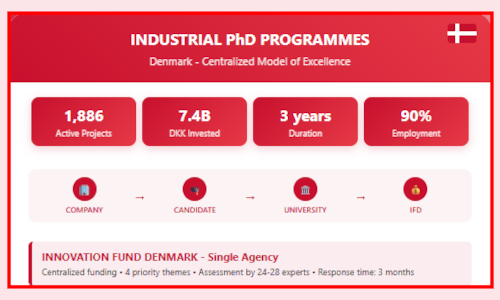

19/09/2025
A Centralized Model of Excellence and Innovation
Denmark has forged an outstanding reputation in university-industry collaboration through its Industrial PhD Programme, centrally administered by Innovation Fund Denmark. This unique system, established since 1971 and refined in 1988, represents today one of the most accomplished models of doctoral training oriented toward innovation and economic value creation.
The Danish Doctoral System: A Centralized Architecture
Architecture of the Dannish Industrial PhD Programme
Eligibility Conditions and Modalities
By Tania Suvorova
The Danish doctoral system is distinguished by its centralization around Innovation Fund Denmark (IFD), an independent public body created in 2014 that unifies industrial research funding. This coordinated approach enables optimal resource allocation and ensures homogeneous programme quality across the country.
With over 1,886 active projects and a budget of 7.4 billion DKK in ongoing investments, Innovation Fund Denmark constitutes the main driver of Danish industrial doctorate development. The system is characterized by a tripartite approach systematically involving the company, university, and industrial PhD candidate.
Innovation Fund Denmark constitutes the unique entry point for industrial PhD funding in Denmark. Created in April 2014, this fund invests in entrepreneurs, scientists, and companies with ideas capable of solving societal challenges.
Mission and Objectives:
Funding Structure:
Innovation Fund Denmark directs its investments according to four political priority themes:
Priority Themes 2024-2025:
Strategic Green Missions (311.1 million DKK in 2025):
Specialized contacts:
Faculty of Arts: Anna Louise Dolan Plaskett (plaskett@au.dk)
Faculty of Natural Sciences: Frederikke Kongsted Hansen (fkh@au.dk), Mie Meulengracht Christensen (mime@au.dk)
Training Centre: Centre for Educational Development manages mandatory IFD course
Required degree: Master's with minimum 10/20 on thesis AND either:
Language skills: Excellent English level required, Danish depending on subject
Location: Headquarters or geographical division in Denmark (2024 extension: Greenland and Faroe Islands) Required capabilities:
Status: University officially authorized to award PhDs Commitment: Ability to assign a supervisor to the project Responsibilities:
Industrial Researcher (PhD and Postdoc):
Other Complementary Programmes:
The Danish industrial PhD programme remarkably illustrates the effectiveness of a centralized and systematic approach to university-industry collaboration. With over 1,200 projects evaluated since its inception and measurable results in terms of innovation, patents, and employment, this model demonstrates its relevance for the national innovation ecosystem.
Denmark's unique architecture, centered on Innovation Fund Denmark, ensures consistency, quality, and impact while maintaining the flexibility necessary for adaptation to specific sectoral needs. This approach makes Denmark a global reference in industrial doctoral training and knowledge transfer.
This article was written by ABG - Association Bernard Gregory, specialist in PhD career development since 1980.
Sources: